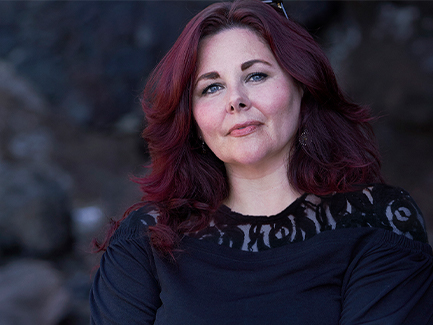
My obesity journey: from comfort eater to plus size model
“I was 28 years old and 180 kilos. I was married, and the mother of two wonderful little boys. There were many things to be happy about in my life, but I was very depressed."
Our body and mind are deeply connected. Just think about how your body immediately reacts when you get nervous – your palms get sweaty and you feel thirsty. What goes on inside our head can also make us more at risk of developing health problems – we can even become more at risk of developing obesity.1
"Some people use food to cope with difficult situations and soothe their feelings when nothing else works. This might work in the short term, but over time it can become a challenge of its own."
None of us can be expected to feel light and happy all the time. So, we all find different ways to soothe our feelings. Some people binge on tv-series instead of getting the sleep they need. Other coping strategies may include smoking, drinking, gambling or shopping.1
Some people use food to cope with difficult situations and soothe their feelings when nothing else works. This might work in the short term, but over time it can become a challenge of its own.1
Psychologists call this behaviour emotional eating. We all do it sometimes – some of us just more than others. Stress, depression and anxiety can all play a role. So can major life events like starting a family, changing jobs or moving home. Or even early life events such as childhood trauma.1
This was true for Vicki Mooney, who turned to food to cope with growing up in a home with an abusive father. By the time she was 28, she weighed 180 kilograms.
“In order to deal with the trauma I would have a bar of chocolate. I would go to my room and even though I was going through those emotions, feelings and pain, I would eat my bar of chocolate and feel a bit of comfort,” she says.
Emotional eating can have many causes. For some, like Vicki, it is linked to severe emotional trauma and pain. But it’s not easy for everyone to link their emotional eating to an exact cause or life event. For some people, it’s stress that can bring it on.1
Once the habit has been formed, it can often take on a life of its own. Many emotional eaters say that it feels like any other addiction, for example, smoking.
This can create a vicious cycle. It starts by eating to soothe emotions, which brings about a temporary relief. But then feeling ashamed for overeating – which starts the cycle all over again.1
”In order to deal with the trauma I would have a bar of chocolate and feel a bit of comfort.”
The cycle is also fuelled by the negative experiences that are common for people who live with obesity. People with obesity often feel rejected by society, or feel that they do not receive the support or understanding that they need from their family, friends, or doctors.
So, it might be reassuring to know that making even small changes to how we live and think can have a huge positive impact on our mental wellbeing. Sometimes we just need someone else’s point of view to help us notice what changes to make – and how to make them. That person can either be a friend, a family member, or a psychologist.1
One place to start, is to look at the source of our negative emotions. Sometimes, simply discovering what they are can be an important first step. A psychologist can help you on this journey.1
"Fortunately, even small changes to how we live and think can have a huge positive impact on our mental wellbeing."2
Another approach is to change the way we respond to our feelings. In this case, behavioural therapy – which helps you to understand and modify your patterns of thinking, eating, and activity – has proven to be effective.1
Not sure where to find help, or who to turn to? A great start is to contact your healthcare provider or another trusted healthcare providers.
The site you are entering is not the property of, nor managed by, Novo Nordisk. Novo Nordisk assumes no responsibility for the content of sites not managed by Novo Nordisk. Furthermore, Novo Nordisk is not responsible for, nor does it have control over, the privacy policies of these sites.

